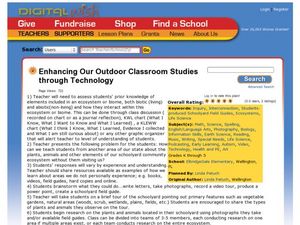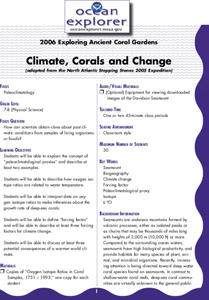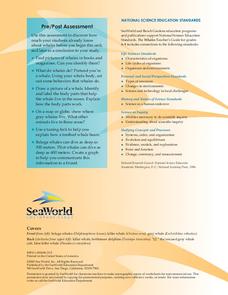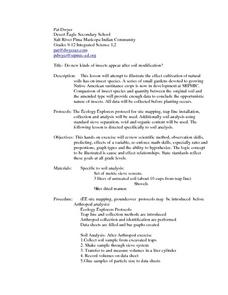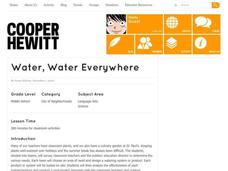Curated OER
Genre Lesson: Autobiography
Have your middle schoolers write a short story about themselves with an autobiography unit about Rosa Parks. They learn the difference between biographies and autobiographies, define the different types of autobiographies and determine...
Curated OER
Fact and Opinion
Sixth graders discuss the terms "explicit opinions," and "implicit opinions," from a text. In this literacy lesson, 6th graders analyze the author's techniques to find explicitly stated opinions. Additionally, students complete a...
Curated OER
You Are What You Eat: Lessons from Alice Waters
Students view the AMERICAN MASTERS episode titled ALICE WATERS AND HER DELICIOUS REVOLUTION. They examine their own eating habits and determine how they can eat food that is both healthier and tastier. Through Guided Reading strategies,...
Curated OER
Two Beets Or Not Two Beets—What Is Your Question?
Students use the scientific method to test an idea regarding the structures of a plant as it supports the biological evidence for life. In this growing roots lesson, students use organizing sheets to record their findings. Students...
Ocean Explorer
Easy as Pi
Seamounts are large, extinct volcanoes that rise up from the bottom of the ocean floor. They are a relatively new landform in the scientific community, and this lesson plan invites students to learn about the amazing diversity of life...
Curated OER
Enhancing Our Outdoor Classroom Studies through Technology
Combine science, math, and more using this resource. Learners use technology to share video and other information about their community with people throughout the state. They learn about the environment, identifying native plants, record...
Sea World
Ocean Discovery
Immerse your young marine biologists in the world of marine animals. The lesson includes several activities that are age-appropriate for preschoolers and kindergartners, including coloring pages, gluing feathers and sand onto paper...
Sea World
Endangered Species
Study different endangered species with several activities that incorporate math, science, language arts, and research strategies. A great addition to your activity on conservation or Earth Day.
Sea World
Marine Animal Husbandry and Training
Step into the role of a zoo director with several activities about animal training and running a zoo. Kids calculate the amount of food each animal needs, design a habitat for penguins, decide how to breed bottlenose dolphins, and train...
NOAA
Climate, Corals and Change
Global warming isn't just an issue on land; deep ocean waters are also showing troubling signs. Young scientists learn more about deep water corals and the many recent discoveries researchers have made. Then they examine data related to...
Cornell University
Beneficial Insects
A lot of people think of insects as pests. But actually, some insects are beneficial because they get rid of pests! After learning about beneficial insects, class members research given insects to find out if they are pests or predators.
Sea World
Whales
A whale of a lesson is sure to intrigue your elementary oceanographers! Learn about the mammals of the sea with a series of activities about whales, dolphins, and porpoises. Kids complete worksheets about the anatomy of a whale, create a...
Chicago Botanic Garden
Causes and Effects of Climate Change
Wrap-up a unit on global climate change with a lesson that examines the causes and effects of climate change. Learners fill out a chart that represents what they think causes climate change—natural and human-based—and what they think...
Curated OER
Fantastic Flower
Here is a clever lesson on pollination of flowers for you. In it, learners study the anatomy of a flower, and play a game in which they simulate the process of pollination. This fine plan brings in elements of art, physical education,...
Chicago Botanic Garden
Impacts of Climate on Forest Succession
Part two in a series of four explores the effects of climate on succession or the changing of plant species in a forest. Groups review how to identify trees and then spend a day in the field collecting extensive data on trees to...
Chicago Botanic Garden
Climate and Forest Ecosystem Services
Forests, through sequestration, capture excess carbon dioxide in our atmosphere and store it, aiding in climate change. The third installment in a four-part series on how climate impacts forests explores carbon sequestration....
Science 4 Inquiry
Introducing the Types of Energy
Young scientists explore many different types of energy including light, heat, nuclear, sound, potential, and more. They match the types of energy and identify when energy transfers from one type to another.
Curated OER
Do new kinds of insects appear after soil modification?
Students explore and experiment with the concept do new kinds of insects appear after soil modification. They assess and review scientific methods of observation, predicting, variables, math skills, ratio, proportions, graphs and the art...
Curated OER
Lesson: Ginger Brooks Takahashi: Powerstich: A Forum for Community-Building
This is a great way to build community in your school, experience process-based art, and explore the critical-thinking process. While quilting as a class collectively (just like a quilting bee) pupils listen to poetry and prose of a...
Curated OER
Water, Water Everywhere
Students devise a system for watering classroom plants during school year and summer breaks. In this watering system lesson, students work in teams to investigate water needs of plants and develop systems that will keep the plants...
Brooklyn Museum
Fred Tomaselli
Kids will observe, write, and create as a way to better understand the work of artist Fred Tomaselli. Guided by great critical thinking questions, learners will first analyze the piece Field Guides. Then, they will write a creative...
Curated OER
Aquatic Roots
Young scientist use reference materials to research various local aquatic plants and or animals to find out whether they are natives or exotics. They investigate their impacts on people, other animals and the environment. Students...
Marine Institute
Water Pollution
Sixth graders investigate the various types of pollutants found in water and ways to help prevent water pollution. Through a hands-on experiment, learners create samples of polluted water by mixing water with vegetable oil, dirt,...
Chicago Botanic Garden
Historical Climate Cycles
Ice core samples give scientists access to climates of old—those from more than 800,000 years ago. Through an analysis of various temperature graphs from ice cores, tree rings, and weather stations, scholars compare historical climates...





